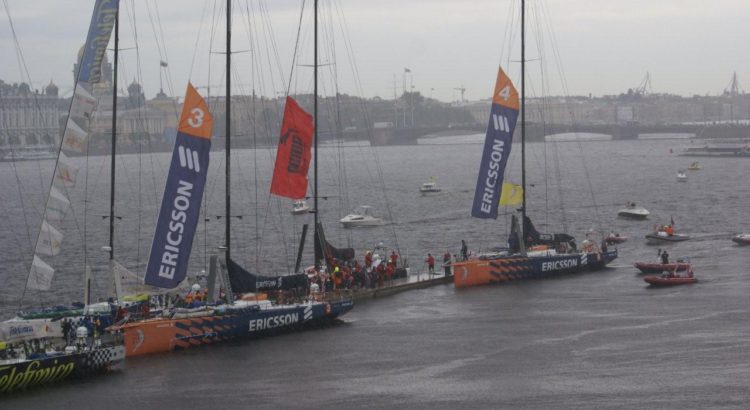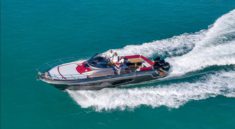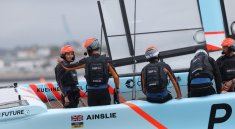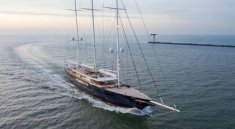On June 27, 2009, the tenth anniversary round-the-world regatta Volvo Ocean Race finished in St. Petersburg, rightly called the "Everest of sailing" in the world.
The team of winners of the race, the crew of Ericsson 4, tells about the difficulties of the path, unpredictable turns, the peculiarities of racing yachts and the secrets of leadership in an exclusive interview.
The Volvo Ocean Race is a real test for real men, many say. In fact, you understand this only when you get inside a racing carbon boat and examine live a few square meters - with two two-story berths, a chart table and a tiny stove, designed only for boiling water, which is diluted with daily rations. Here, a team of 11 people spend almost 9 months battling the winds and deliberately looking for storms in order to go faster. A week of rest in each port is nothing compared to a multi-day race, which the team overcomes stage by stage, moving towards the finish line.
Entering the race with two crews, Ericsson 3 Nordic - yachtsmen from Northern Europe, and Ericsson 4 International - an international crew, Ericsson took care of everything in advance - excellent funding, boats, equipment, a year of joint pre-training. All this is of great importance in the race, but, of course, does not cancel physiological processes - throughout the regatta, yachtsmen continuously lose weight. And when all the fat mass is “burned”, the body begins to burn muscle. “In order to recover now, we need to lie in front of the TV for three months and eat sandwiches,” the giant yachtsmen laugh. The race is over, now they are standing in a bar and drinking beer from small bottles of 0.33. I come up and take turns shaking huge wooden hands: “Tell me about the race? ..”. Ryan Godfrey, bow sailor of the Ericsson 4 team, readily agreed to answer the questions.
What was, in your opinion, the most difficult?
A long tense stay at sea, I think, and I think the whole team will agree with me. The longest crossing - Qingdao - Rio de Janeiro (12,300 nautical miles, ed.) - took us 40 days. We were in constant tension, and it was very hard physically, especially considering the conditions of existence on the boat, a minimum of space, a minimum of amenities - everything to win. The weather also played a role - there were unrealistically cold winds at this time, in February-March. We naturally struggled with the elements, and there was no end in sight to this stage.
How did you manage to win? For two members of your crew - watch officers - this is already the third, record victory, and for two more - already the second ...
We worked very hard before the race, we started preparing at an early stage. We have a training yacht and we have been practicing on it for almost a year. So by the time of the start, we already had a well-functioning team. In addition, we are very attentive to the choice of equipment. This is the first time I personally participate in this race, and of course, four winners on board could not but create the right atmosphere.
How was your team formed? “According to the announcement” recruited, or were you all acquaintances, friends, or friends of friends - how did the skipper make decisions?
In general, this is a hodgepodge, all from different countries, people you know and with whom you have already raced somewhere, or people from other teams that you see for the first time. Initially, we had another skipper, and he took our champions, people whom he knew well, as watch officers, and then they formed the crew.
And how difficult is it for people who barely know each other to spend almost 9 months together, side by side, and even in such conditions and with such emotional stress?
Yes, it's very difficult. 11 men in such a tiny space! We slept in the same beds and ate from shared dishes. To endure this, we just needed to really get closer, make friends, feel that we are working together as a team, as a single organism. And we were also lucky that before the start of the race we had almost a year of training in the Canary Islands, so by the time of the start we had already worked together at least as a team. Therefore, we began to win already in the first long stages of the race.
Was it clear from the very beginning which side was winning? Did you immediately feel your leadership? Or in reality, everyone had approximately equal chances?
At the very beginning, however, it was very difficult to say. Our main rivals were the Telefonica Blue team, at the first stages of victories we had an equal number. And in general, there were many worthy contenders for leadership, these were both Puma and Ericsson 3 – during the race, the picture was constantly changing from stage to stage, the struggle was intense until the very end, especially considering the push of the Puma team in the last stages. In fact, not only the teams, but also the boats of all participants are a little different - they are all, of course, fast, they travel at speeds up to 70 km / h, some are faster, some are slower, but in different wind conditions they behave differently . And a lot depends on how well the team knows their boat, all the subtleties of its character. It happens that you discover some of her qualities already at the very end of the race, and before that you had no idea about them.
Have you had any racing accidents?
Yes. At the first stage - Alicante - Cape Town (6,500 nautical miles, ed. note) - our helmsman Tony Matter suffered a knee injury, inflammation began, our onboard treatment did not help, and we had to evacuate him to Cape Verde. Halfway through, they changed course and handed him over to a fishing boat. The situation turned out to be so serious that he never returned to us until the end of the race, and he still has problems with his knee.
Do you have any traditions on board? A motto, a battle cry, some command internals, in general?
We have an international team, all from different countries - Brazil, Australia, New Zealand, Great Britain. Each has its own traditions. The only thing we have in common is the celebration of crossing the equator. Such an international maritime tradition - there is a special ceremony for it.
The last question - how do you like St. Petersburg and Russia in general? Is this your first time with us?
Yes, for the first time. True, I still didn’t have time to really see anything - we finished today at 3 am in the Gulf of Finland, and then immediately went to the hotel. Well, and then we walked along the Neva to the awards ceremony, looked at the drawn bridges. In general, I really liked what I saw. We will be here for a couple more days, so I will still have the opportunity to walk around the city and see everything better.
They have very happy faces and a very relaxed, distracted look. No one is looking into the camera lens - the yachtsmen are looking at each other and at the girls in evening dresses coming to the champagne bar. It remains to be hoped that they will like St. Petersburg, and Russian ports, along with other world ports, will now annually host the start, finish or intermediate stages of international races of this level.
We would like to thank GORE-TEX® for their assistance in arranging the interview.
Evgenia Belaya, photo by the author
Especially for Yacht.Ru




